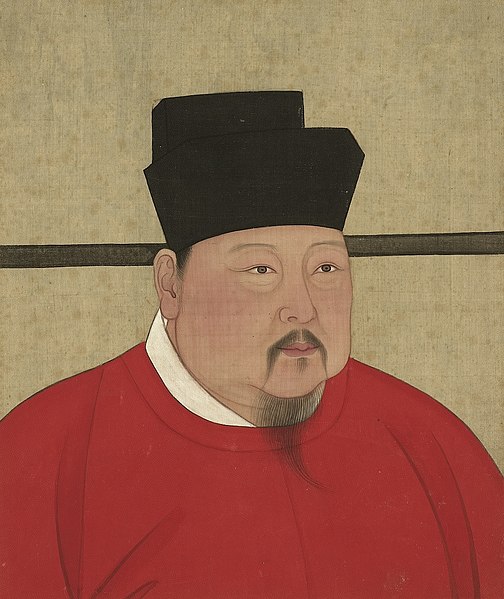
Image Source: Public Domain
About Emperor Zhenzong
Lifespan: 968 – 1022 A.D
Reign Years: 997 – 1022 A.D
Given Name: Zhao Heng
Reign Name: Zhenzong

Image Source: Public Domain
Lifespan: 968 – 1022 A.D
Reign Years: 997 – 1022 A.D
Given Name: Zhao Heng
Reign Name: Zhenzong
Emperor Zhenzong was the third emperor of the Song Dynasty. His given name is Zhao Heng, and he ruled as emperor from 977 to 1022. He was Emperor Taizong’s son and has a temple name which means “True Ancestor”.
Emperor Zhenzong became known for strengthening and improving Confucianism. He was also known for closing a peace agreement with the Liao empire, ending several decades of warfare.
Go back in time and follow the timeline and emperors of the Song Dynasty.
Read MoreZhao Heng was considered a graceful crown prince who excelled in both calligraphy and poetry. At a young age, he played games and acted out as a commander, leading his “army” to battle. This was a sight appreciated greatly by his father.
As the third son, he was nominated as the crown prince. This occurred after his two older brothers died. When his father passed, the empress dowager of that period joined a powerful eunuch who initiated a coup.
They attempted to support another prince, who was much easier to control and manipulate if he became the new emperor. However, the prime minister heard of this plan, defeated the empress and eunuch, then supported Zhao Heng to the throne. After, Zhao Heng began reigning the empire as the Song Dynasty emperor, where he proved to be a capable leader.
Rare and unique Chinese antique blue and white porcelain Ming dynasty vase, the lower part of the vase is shaped as a big bowl decorate with foo dogs surrounded by clouds, in the center of the vase phoenix birds are painted in blue surrounded by peony blossom alternatively rendered and in profile.
Buy Now!Remarkable and rare made of high quality blue and white porcelain this dragon vase is from the early Ming dynasty, the vase is decorated with clouds and peony blossom and remarkable work of a dragon in clay. It has a long cover in perfect condition. The clay has a small chip near one of the dragon 3 claw hands
Buy Now!This antique blue and white porcelain plate features a beautiful and complex inverted painting with rich blue tone colors in the center, surrounded by a double ring peony blossom alternatively rendered and in profile, In the outer rim there is a painting in blue on white leaves surrounding the entire plate.
Buy Now!Emperor Zhenzong’s way of ruling was noted for the strengthening of power and the whole Song Empire. It prospered along with its military might, which made the empire even more formidable. However, this also started the foreign policy leading to the Khitan-led Liao dynasty, which eventually resulted in humiliation.
Around the year 1004, the Khitans waged war against the Song. This was where Zhenzong, the Song Dynasty emperor, led his army against the Khitans and retaliated with a powerful attack.
Yet, despite their successes, the emperor ended the Chanyuan Treaty.
The Chanyuan Treaty ensured a century of peace. However, the Song Empire had to follow and agree to an inferior spot to the Liao Empire.
Not only that, but the Song had to annually pay a tribute of 100,000 ounces of silver. They were also required to give more than 200,000 silk bolts.
This admission of inferiority plagued the Song Dynasty’s foreign affairs while continuous payments started depleting their coffers. This occurrence was usually criticized in China’s history since Emperor Zhenzhong used the money for peace. It was even more frustrating since they signed a bizarre treaty even when Song was winning.
Despite this, some people supported and praised their emperor since the pact allowed people to live in peace. Plus, it was able to offer good communications among various regimes.
The third emperor of the Song Dynasty stressed how important Taoism is at the imperial court. During his reign, the “Heavenly Texts” glorifying the Zhao clan was discovered. It was followed by various sacrificial ceremonies that occurred at Mount Tai.
From the years 1013 to 1015, Emperor Zhenzong issued decrees that defied the Jade Emperor as Heaven’s highest ruler. Declaring divine revelation, he even made a couple of new cults, resulting in the fusion of Taoist and Buddhist religions. Plus, he optimized Confucianism’s influence, decreeing that all temples for Confucius should be built in every city district.
This rare celadon jar from the ancient Song Dynasty features a beautiful all-olive green design, smooth and shiny, with a firm base from which grows an asymmetrically oval body with elegant grooved borders to a modest, slightly raised rim.
Buy Now!This rare preserved Song Dynasty celadon plate has a design devoid of decoration that makes it look like a beautiful, untouched piece of jade. Its bottom rests on a base that grows in layers around a small foot that grows along fine grooved borders.
Buy Now!This rare Song Dynasty ewer possesses an irresistible natural charm that exudes simplicity and grace in every part. It has an uncluttered base with a small foot that gives rise to a firm, sturdy body, devoid of any more decoration than a simple protruding medallion.
Buy Now!In 1020, the Song Dynasty emperor Zhenzong fell ill, which caused his death. When he couldn’t handle the state’s affairs, his wife Empress Liu established power behind the throne.
She handled various state affairs and continued acting as an unofficial regent of the country. She took this position for the remaining years of Zhenzong’s life.
Emperor Zhenzong died in the year 1022 and was succeeded by Zhao Zhen, his 4th son. He took the throne and was hailed Emperor Renzong, yet all power and control were still under Empress Liu. She eventually became the empress dowager.
Join the VIP club, Get Auction notification, special offers and more!